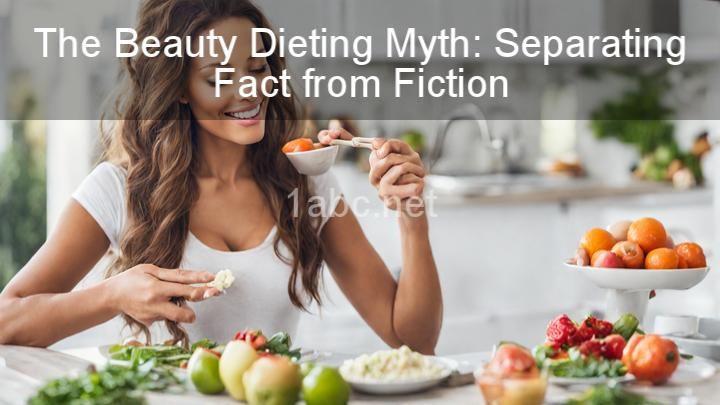The Beauty Dieting Myth: Separating Fact from Fiction

Introduction:
In a world obsessed with beauty standards, the allure of the beauty dieting myth is hard to resist. We are bombarded with advertisements promising quick fixes to achieve flawless skin, shiny hair, and the perfect figure. But is there any truth to these claims, or are we falling victim to a myth that perpetuates unrealistic expectations? In this blog post, we will delve deep into the beauty dieting myth and separate fact from fiction. So sit back, relax, and get ready to uncover the truth about beauty and dieting.
I. Understanding the Beauty Dieting Myth:
Before we can debunk the beauty dieting myth, we need to understand what it entails. The beauty dieting myth is the belief that by following certain diets or eating specific foods, we can achieve the physical attributes associated with beauty. These attributes often include clear skin, shiny hair, and a slim figure. People are drawn to this myth because it promises a shortcut to beauty, bypassing the hard work and dedication required for long-term results. It persists in popular culture because it taps into our insecurities and desire for instant gratification. However, it is essential to separate fact from fiction and recognize the common misconceptions related to beauty and dieting.
II. Debunking Beauty Dieting Myths:
A. Myth 1: Crash Diets are Effective for Quick Results
One of the most prevalent myths surrounding beauty dieting is the idea that crash diets can deliver quick results. However, this couldn't be further from the truth. Crash diets, which involve severely restricting calories or eliminating entire food groups, may lead to initial weight loss, but this weight loss is often unsustainable and unhealthy. When we drastically reduce our caloric intake, our bodies go into survival mode, slowing down our metabolism and conserving energy. As a result, we may experience temporary weight loss, but once we resume normal eating patterns, the weight tends to come back, often in greater amounts. Slow and steady weight loss, achieved through a balanced diet and regular exercise, is much more beneficial in the long run as it allows our bodies to adjust and maintain a healthy weight.
B. Myth 2: Certain Foods Guarantee Clear Skin or Shiny Hair
Another common myth perpetuated by the beauty dieting industry is the notion that specific foods alone can guarantee clear skin or shiny hair. While there is no denying that nutrition plays a role in our overall health and appearance, it is unrealistic to expect that a single food or group of foods can solve all our beauty woes. Clear skin and shiny hair are influenced by a variety of factors, including genetics, hormones, lifestyle choices, and environmental factors. While incorporating nutrient-rich foods into our diet is important for overall health, it is crucial to adopt a holistic approach that takes into account all aspects of our lifestyle, such as managing stress, getting enough sleep, and practicing good skincare habits.
C. Myth 3: Restrictive Eating Habits Lead to Lasting Beauty
Perhaps one of the most damaging myths perpetuated by the beauty dieting myth is the belief that restrictive eating habits can lead to lasting beauty. The truth is that restrictive eating habits, such as severe calorie restriction or eliminating entire food groups, can have detrimental effects on both our physical and mental health. When we deprive our bodies of essential nutrients, we may experience nutrient deficiencies, weakened immune systems, and decreased energy levels. Moreover, restrictive eating can lead to an unhealthy relationship with food, causing feelings of guilt, shame, and anxiety. True beauty goes beyond physical appearance; it encompasses self-care, body positivity, and holistic well-being. Embracing a balanced approach to nutrition that nourishes our bodies and minds is the key to lasting beauty.
III. The Reality of a Balanced Approach:
Now that we have debunked the beauty dieting myths, it's time to explore the reality of a balanced approach to beauty and well-being. Nourishing our bodies from within is essential for achieving optimal health and vitality. Instead of focusing on specific foods, we should aim to incorporate a variety of nutrient-rich foods into our daily meals. This includes fruits, vegetables, whole grains, lean proteins, and healthy fats. By prioritizing a balanced diet, we can provide our bodies with the necessary vitamins, minerals, and antioxidants to support healthy skin, hair, and overall well-being.
In addition to nourishing our bodies, building healthy lifestyle habits is crucial for both our physical appearance and inner confidence. Regular exercise not only helps maintain a healthy weight but also improves circulation, promotes glowing skin, and boosts mental well-being. Managing stress through techniques such as meditation, yoga, or engaging in hobbies can also have a positive impact on our overall appearance. And let's not forget the importance of adequate sleep, which allows our bodies to repair and regenerate, resulting in a refreshed and rejuvenated look.
While a balanced approach is essential, seeking professional guidance should not be overlooked. Registered dietitians or healthcare professionals can provide personalized advice tailored to individual needs. They can help us navigate through the sea of misinformation and ensure that we are making informed choices based on scientific evidence. Choosing evidence-based information over quick-fix solutions is crucial for our long-term health and well-being.
Conclusion:
In conclusion, the beauty dieting myth perpetuates unrealistic expectations and often leads to disappointment and frustration. Instead of falling victim to this myth, we should embrace a balanced approach to beauty and well-being. By understanding the truth behind the beauty dieting myth and debunking its common misconceptions, we can make informed choices that promote lasting beauty and overall health. Let's shift our focus from external appearances to self-acceptance and self-care. Remember, true beauty comes from within, and it is achieved through a holistic approach that nourishes our bodies, minds, and souls. So let's embrace our uniqueness, celebrate our individuality, and radiate beauty from the inside out.
FREQUENTLY ASKED QUESTIONS
What is The Beauty Dieting Myth: Separating Fact from Fiction?
"The Beauty Dieting Myth: Separating Fact from Fiction" is a book written by Joy McCarthy, a certified holistic nutritionist. In this book, McCarthy debunks common beauty and dieting myths and provides evidence-based information to help readers achieve true health and beauty. She discusses various topics such as the impact of certain foods on skin health, the truth about anti-aging diets, and the importance of a balanced approach to nutrition.
Through her book, McCarthy aims to educate readers about the misconceptions surrounding beauty and dieting, empowering them to make informed choices for their health and well-being. She emphasizes the significance of nourishing the body from the inside out and adopting sustainable lifestyle habits rather than following restrictive beauty and dieting trends.
Overall, "The Beauty Dieting Myth: Separating Fact from Fiction" challenges conventional wisdom and offers a fresh perspective on beauty and nutrition, shedding light on the truths and falsehoods that often prevail in these areas.
Who is the author of The Beauty Dieting Myth: Separating Fact from Fiction?
The author of "The Beauty Dieting Myth: Separating Fact from Fiction" is Carly Pollack.
What is the main objective of this book?
The main objective of this book is to provide comprehensive information and insights on a specific topic or to convey a particular message or storyline. It aims to educate, entertain, inspire, or provoke thought and discussion among its readers. The main objective may vary depending on the genre, such as a textbook aiming to educate students or a novel aiming to tell a captivating story.
What topics are covered in The Beauty Dieting Myth: Separating Fact from Fiction?
"The Beauty Dieting Myth: Separating Fact from Fiction" covers various topics related to dieting and its impact on beauty. Some of the topics discussed in the book may include:
- The concept of beauty and its relationship with dieting
- Common myths and misconceptions about dieting and its effects on appearance
- The role of nutrition and its impact on skin health
- The influence of certain foods and nutrients on hair and nail health
- Debunking popular dieting trends and their claims of enhancing beauty
- The psychological aspects of dieting and body image
- The importance of maintaining a healthy and balanced diet for overall well-being
- Practical tips and advice on developing a healthy relationship with food and body image
These topics aim to provide readers with valuable insights and evidence-based information to help them separate fact from fiction when it comes to the dieting-beauty connection.


